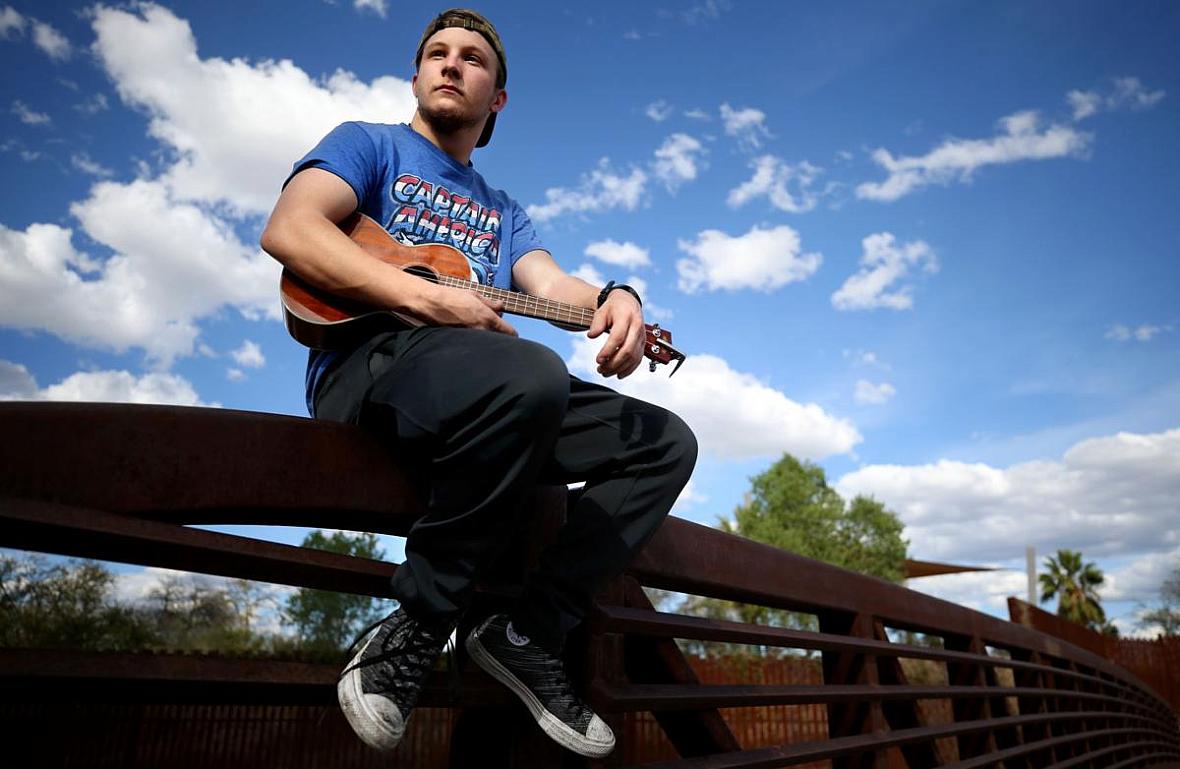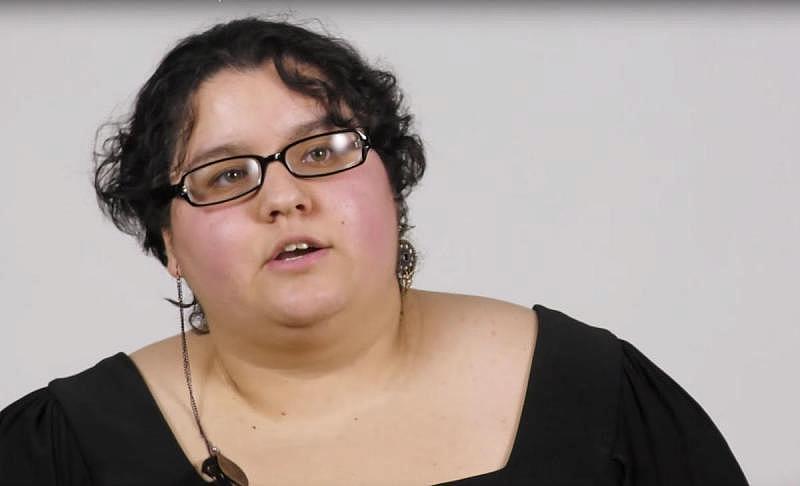Part 3: Out of the system, young adults find themselves 'flooded with freedom'
"Fixing our foster care crisis” was made possible through major funding from the Community Foundation for Southern Arizona and additional support from the University of Southern California Annenberg Center's Fund for Journalism on Child Well-being.
Other stories in Part 3 of this series include:
In California, a data-driven 'life boat' for those transitioning out of foster care
How states can help children return to repaired families
Hard work of reunification often entails rehab, intensive home services
In their own words: Aracely Valencia
In their own words: Donald Jayne
In their own words: Alexei Ruiz
“I felt unwanted:” Tucson kids talk about hardships of foster care

Tucsonan Donald Jayne, now 20, opted to remain in what's known as "extended foster care." He's part of an independent living program whose rent subsidies zero out when he turns 21. Kelly Presnell / Arizona Daily Star
Donald Jayne could have lost everything the day he turned 18 — his housing, his friends, the adults he turned to for support and guidance. Growing up in foster care in Tucson, becoming a legal adult meant that he didn’t have to stay in “the system.”
No more early curfews. No one keeping tabs on where he went. No one to ask if he was OK. No more oversight by child welfare case workers.
Turning 18 also meant Jayne, who goes by DJ, would be cut loose from the ties that had kept him moored. He was free from the rules of the group home where he’d lived — no more asking his caseworker for permission to do things other teenagers took for granted, like going to the movies with friends, or to the prom.
“I felt like I was dropped out on my own. You’re legitimately flooded with all this freedom,” he said. “But there is no support. There is no transition.”
DJ missed being able to talk to some of the staff he’d grown close to at the group home where he lived, the latest in a line of foster care placements.
For each of the past five years, roughly 700 to 800 Arizona youths turned 18 while in foster care. Each faced a choice:
1) Voluntarily stay in the state child welfare system that has had control in their lives since someone reported they were being neglected or abused at home.
Or
2) Leave the child welfare system — and the support services that come with it.
It can be a make-or-break decision.
Searching for solutions that could work in Arizona, the Arizona Daily Star talked with more than 100 experts in child safety reform and traveled to six states to see what’s working there. For today’s report on reinvention, the Star visited California for a program where foster kids who age out of the system get the support they need to move toward a healthy adulthood.
Half choose to stay
This junction is crucial — and youths who’ve aged out of foster care have developed coping skills that can hold them back as they enter legal adulthood. Resistance to making attachments is an understandable byproduct of a lifetime of moving from place to place, family to family, group home to group home.
A permanent sense of impermanence is hard to live with, and harder to grow up with. Little belongs to you — youths talk about moving their possessions around in a black trash bag — and decisions aren’t yours to make.
Arizona was one of the first states to extend foster care to age 21, said Megan Arrigo of Children’s Action Alliance. “Arizona has pretty good support and services for young people. There are a lot of practical issues — a lack of knowledge around what is available to them.”
DJ evaluated his options and realized he still needed support. He decided to remain in what’s known as “extended foster care.”
“I’m still in CPS,” said DJ, who’s now 20. “Not enough kids do that.”
The young adults who choose extended foster care must sign a “voluntary” — paperwork that states the youth consents to stay in services. Court supervision of the youth ends, but he or she still has a caseworker and can receive help with rent and other expenses.
About half of the youths who age out each year decide to stay in the Department of Child Safety system, formerly called Child Protective Services. The other half “say I’m not signing the voluntary. I’m out of here,” Arrigo said.
“Part of that is they’re just so system-fatigued, they’re ready to be independent.”
Tucsonan Alexei Ruiz: “Everyone expects us to be normal when we’re 18.” Nick Murray / Arizona Daily Star
Arizona’s DCS has several independent living coordinators, who work with older foster youths, through age 21. Caseloads are high. And each 18-year-old a caseworker persuades to stay in foster care adds to the load.
Staying in foster care can mean living in a group home while going to school, remaining with a foster family (which will keep receiving monthly DCS stipends), or living independently in a dorm or apartment with state funds to help with living expenses.
DJ is part of an independent living program that helps pay his rent but with an amount that decreases every six months until it zeroes out when he turns 21. As the support draws down, he’s supposed to step up financially. Independence is not easy although DJ is serious about building his foundation before taking on more.
“I wanted to figure out how to ‘adult’ before taking on school,” he said. His goal is to work in law enforcement.
Arizona offers tuition and training assistance, including bus passes and room and board, to youths who’ve been in foster care after they turned 16. Nonprofit agencies provide help with résumés, applying for jobs and those kinds of life skills.
But, even with these benefits, half of those who stay at 18 leave extended foster care before they’re 19.
“For young adults, when they turn 18 they have a lot of needs,” Arrigo said. “They’re supposed to be independent, but they’ve grown up in a system that has not allowed them to become independent.”
Alexei Ruiz’s biological parents were “gasoline and fire.” After turning 18 Ruiz left foster care and went to live with Ruiz’s biological mom. It didn’t last long. Ruiz felt the pressure of becoming a legal adult without the skills and experience needed to function well.
“Everyone expects us to be normal when we’re 18 all of a sudden,” Ruiz said. “It’s the worst feeling in the world.”
If someone leaves the extended foster care program, he or she can come back until age 21. But the hoops are high, and Arrigo said last year only about 25 youths successfully returned. The youth has to be enrolled in school fulltime, or working an average of 80 hours a month, or doing a combination of the two.
Young adults often struggle with responsibilities and priorities — it’s part of brain development. Add to that a childhood of uncertainty, temporary living situations and often other trauma, and it’s no surprise that so many former foster children founder on their own.
Yet Arizona’s program to help ends up excluding them when they stumble.
“You see a young person struggling — they’ve been laid off, are unemployed, can’t stay in school and they can’t meet the requirements, so the department says, ‘We have to close you,’” Arrigo said.
“How do we make it more accessible and successful?”
AGE-APPROPRIATE
Child welfare systems have an unavoidable operational flaw:
Children grow up.
But the foster care experience isn’t one a child can simply grow out of or leave behind. It has lasting effects, whether the child is reunified with her family or ages out of the system at 18 or 21.
The child welfare system can stymie brain development. Benchmarks that pass without much note or even realization in a family setting — making decisions about what to do after school, figuring out interests in sports or art, going to sleepovers, school dances, getting a part-time job, staying out later, being trusted to baby-sit — require freedom within a safe framework.
Human development requires trust, risk-taking, critical thinking, choosing for oneself. The DCS system requires permission for almost everything — getting a job, going to prom, visiting a friend. For youths living in group homes, it’s more than a hassle. It prevents them from developing the skills they need to go from surviving to thriving.
Life after foster care requires significant adjustments — demands they may not be ready to handle.
Change is essential for success as an emerging adult. But the realities of living within a system, and then adjusting to life outside its framework, is a challenge for all involved.
Children understand the world based on their own experience — that is their normal, even if it includes abuse or neglect. They expect people to behave in the way they have experienced them behaving before. Their worlds are stagnant, in a sense.
But everything changes when a child is removed from their home. Even if placed with relatives, the child’s world has been turned upside down.
Ruiz moved back home after leaving foster care, but the reunion only lasted a month. Now, the biggest hole in Ruiz’s childhood in the system has become starkly apparent.
“There are skills they don’t teach,” Ruiz said. “We never had that, the knowing that there is at least one person who had your back, no matter what.”
[This story was originally published by the Arizona Daily Star.]

